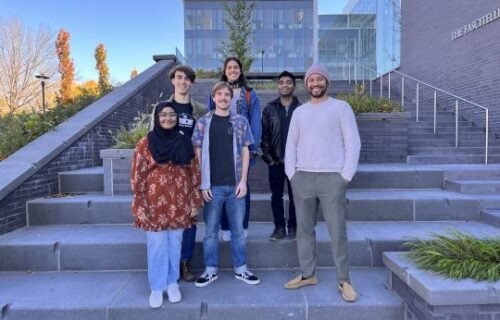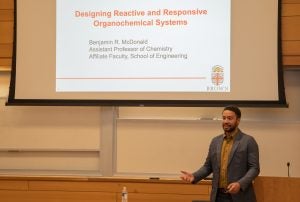Investigator Focus
Benjamin McDonald, PhD
Developing Photonic Thin Films for Colorimetric Detection of Waterborne Pollutants
Access to safe drinking and recreational water in the United States is a significant issue for much of the population and Dr. Benjamin McDonald is researching simple portable devices urgently needed to detect harmful microbes and chemical pollutants. McDonald is an Assistant Professor of Chemistry at Brown University, and his Early Career Development (ECD) award (2022-24) is addressing this requirement. His research focuses on the development of polymer systems with programable structure, assembly, and reactivity directed toward human health. He stated, “I’m awestruck by the way that nature builds materials, using molecular structure to create distinct nanostructures that in turn yield macroscopic structures like tissues. We are attempting to mimic this approach from the bottom with our design of polymeric materials.”
“There are a variety of harmful entities in drinking water, marine and freshwater bodies of water that increasingly threaten human and ecological health in RI and the greater United States. These hazards are diverse, spanning micron-sized microbial pathogens and sub-nanoscopic small molecules, such as perfluoroalkyl species (PFAS), the latter of which we’ve recently been hearing about in the news. Despite being found in similar and oftentimes the same water sources, the tests used to detect them are very different, making comprehensive analysis more challenging and expensive. With the goal of making a unified test for these hazards simple and put it in the hands of everyday people, we are aiming to develop chemistries that make simple color-based dip tests possible.”
This work will provide fundamental design insights to render polymers into customizable building blocks that can be deposited into fibrous thin films that interact with light to create colors. By specifically responding to analytes of interest and changing in color, these thin films can provide a general route to colorimetric sensors that operate in complex sample environments such as breath, urine, blood, bodies of water, and ambient air. Dr. McDonald anticipates that his work may initiate the development of a unified sensing system for persistent environmental monitoring systems, wearable chemical exposure sensors, and point-of-care biomedical diagnostics.

Front: Zannatun Noor (graduate student), Aiden Saul (graduate student), Ben McDonald (PI)
Dr. McDonald enjoys working closely with researchers at the University of Rhode Island (URI). He said, “Having these broad, integrated research aspirations means you need plenty of outside expertise. I’m quite fortunate that URI is nearby!” His lab group visited collaborator Professor Ryan Poling-Skutvik (URI’s College of Engineering) to learn about rheology, the study of the flow of materials. “As part of our interest in making responsive materials, we recently prepared new polymers that have shown unexpected behavior in salty water mixtures. Dr. Poling-Skutvik, an expert in the study of soft materials is helping us understand this behavior, so that we may harness it to create materials that spontaneously respond to their environment.”
McDonalds’ ECD mentor, Professor Jason Dwyer, is also from URI. “Jason is an expert in sensors, but more importantly, he is a compassionate individual. I enjoy chatting with him and have found him to be an impactful mentor. Starting your own independent research program is a big step forwards and Jason’s words of advice have certainly made a big impact on my settling in!”
 A guest speaker at the joint URI College of Pharmacy/RI-INBRE Seminar Series (May 2022), Dr. McDonald’s talk “Designing Reactive and Responsive Organochemical Systems” was an overview of his research as a trainee and how it informed his current research program.
A guest speaker at the joint URI College of Pharmacy/RI-INBRE Seminar Series (May 2022), Dr. McDonald’s talk “Designing Reactive and Responsive Organochemical Systems” was an overview of his research as a trainee and how it informed his current research program.
When asked, how did you become interested in science? McDonald replied “I was quite fortunate to be born into a science family. My father was a science educator in middle school, and my mother was a research scientist at the USDA Forest Service. I spent much of my time as a kid learning about forests and generally the science of nature. As a rebellious kid, I found this unsatisfactory, I wanted to know why things were happening! When I learned of chemistry and that you could describe much of why things happened through molecules I was hooked!”
“I’ve always wanted to become a researcher; I could think of no better path in life than having the privilege of investigating the workings of the world and living things. I found a strong interest in organic chemistry because so much of the function of living things is based on the chemistry of organic molecules (molecules made of carbon, hydrogen, oxygen, and nitrogen). I actually fell in love with organic chemistry when I realized how subtly amazing it is as a language. It’s pictorial, as in we draw the structures. It’s effectively a hieroglyphic language, where the more you know about the implications of the specific connectivity and shapes, the more information you can glean from the structure, without the structure itself ever-changing! And even more amazingly, you can create things, well molecules, that you dream up. For me it’s as much of a creative outlet as it is a scientific one.”
McDonald received his Ph.D. in Organic Chemistry from Northwestern University (’18), studying the synthesis of small organic molecules. He developed a passion for designing responsive organic macromolecules as a postdoctoral fellow at MIT (’18-21). Referring to what he studies in his lab, McDonald said, “I often times describe myself as a molecular cartoonist. I dream up a molecule that I think will have certain properties and attempt to make it! Then through the process of creation, you can refine its design and thoroughly understand how it works. The typical descriptor for this is a “synthetic chemist.” I started out as a graduate student making small molecules, now my lab works on creating macromolecules that have specific properties like spontaneous assembly, based on their chemical composition and shape.”
His biggest accomplishment so far has been “…to start my independent research group at Brown. It’s the culmination of about 13 years of training in chemistry and it’s taken quite a bit of perseverance to overcome the scientific challenges as well as the personal loss that happened along this journey.”
“While science is inherently a creative enterprise for me, I very much enjoy working with other scientists. You learn so, so much just from interacting with other perspectives, particularly folks who weren’t trained in the same discipline as you. These sorts of conversations feed new insights for me, which is what keeps me engaged in my science!”
“The RI-INBRE program has been helpful in two primary ways. It’s provided critical funding to jump-start my lab. I’ve been able to bring in colleagues who have been able to advance my research quickly and in unexpected directions, which is just so exciting.
It’s also brought me into contact with scientists at URI, which has also been quite stimulating for my science and research group.”
McDonald has extensively published and presented his research widely. His honors and awards include the Department of Chemistry Award for Outstanding Service (MIT), the MLK Visiting Professors and Scholars Fellowship (MIT), the Dreyfus Teaching Award (Northwestern), the Ruth L. Kirschstein National Research Service Award (NRSA) Individual Predoctoral Fellowship (Northwestern), and numerous undergraduate awards.
